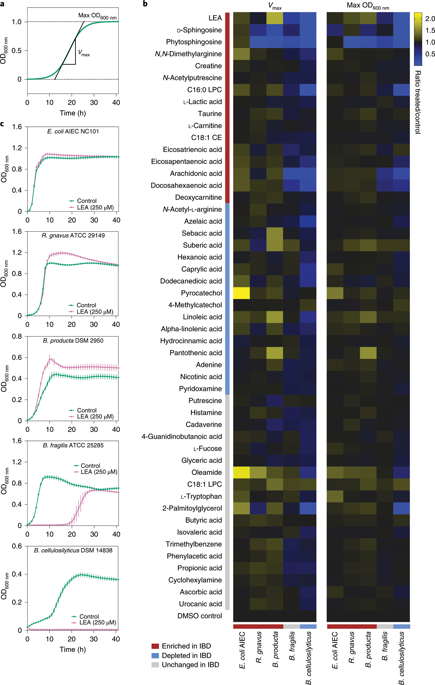Nature Microbiology ( IF 20.5 ) Pub Date : 2020-01-20 , DOI: 10.1038/s41564-019-0655-7 Nadine Fornelos 1 , Eric A Franzosa 1, 2 , Jason Bishai 1 , John W Annand 3 , Akihiko Oka 4 , Jason Lloyd-Price 1, 2 , Timothy D Arthur 1 , Ashley Garner 1 , Julian Avila-Pacheco 1 , Henry J Haiser 3 , Andrew C Tolonen 1 , Jeffrey A Porter 3 , Clary B Clish 1 , R Balfour Sartor 4 , Curtis Huttenhower 1, 2 , Hera Vlamakis 1 , Ramnik J Xavier 1, 5, 6, 7

|
Inflammatory bowel diseases (IBD) are associated with alterations in gut microbial abundances and lumenal metabolite concentrations, but the effects of specific metabolites on the gut microbiota in health and disease remain largely unknown. Here, we analysed the influences of metabolites that are differentially abundant in IBD on the growth and physiology of gut bacteria that are also differentially abundant in IBD. We found that N-acylethanolamines (NAEs), a class of endogenously produced signalling lipids elevated in the stool of IBD patients and a T-cell transfer model of colitis, stimulated growth of species over-represented in IBD and inhibited that of species depleted in IBD in vitro. Using metagenomic sequencing, we recapitulated the effects of NAEs in complex microbial communities ex vivo, with Proteobacteria blooming and Bacteroidetes declining in the presence of NAEs. Metatranscriptomic analysis of the same communities identified components of the respiratory chain as important for the metabolism of NAEs, and this was verified using a mutant deficient for respiratory complex I. In this study, we identified NAEs as a class of metabolites that are elevated in IBD and have the potential to shift gut microbiota towards an IBD-like composition.
中文翻译:

N-酰基乙醇胺对肠道细菌生长的影响反映了炎症性肠病中细菌丰度的改变
炎症性肠病(IBD)与肠道微生物丰度和腔内代谢物浓度的变化有关,但特定代谢物对健康和疾病中肠道微生物群的影响仍然很大程度上未知。在这里,我们分析了 IBD 中丰度不同的代谢物对 IBD 中丰度也存在差异的肠道细菌的生长和生理学的影响。我们发现N-酰基乙醇胺 (NAE) 是 IBD 患者粪便中升高的一类内源性信号脂质,也是结肠炎的 T 细胞转移模型,可刺激 IBD 中过度代表的物种的生长,并抑制 IBD 中缺乏的物种的生长。体外炎症性肠病。使用宏基因组测序,我们概括了 NAE 对离体复杂微生物群落的影响,在 NAE 存在的情况下,变形菌门大量繁殖,拟杆菌门减少。对相同群落的宏转录组分析确定了呼吸链的组成部分对于 NAE 的代谢很重要,并且使用呼吸复合物 I 缺陷的突变体验证了这一点。在这项研究中,我们将 NAE 确定为 IBD 中升高的一类代谢物并有可能将肠道微生物群转变为类似 IBD 的成分。











































 京公网安备 11010802027423号
京公网安备 11010802027423号